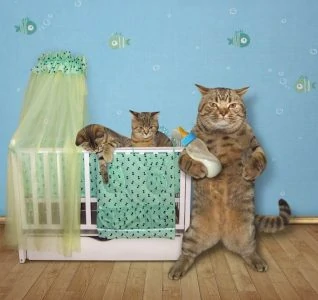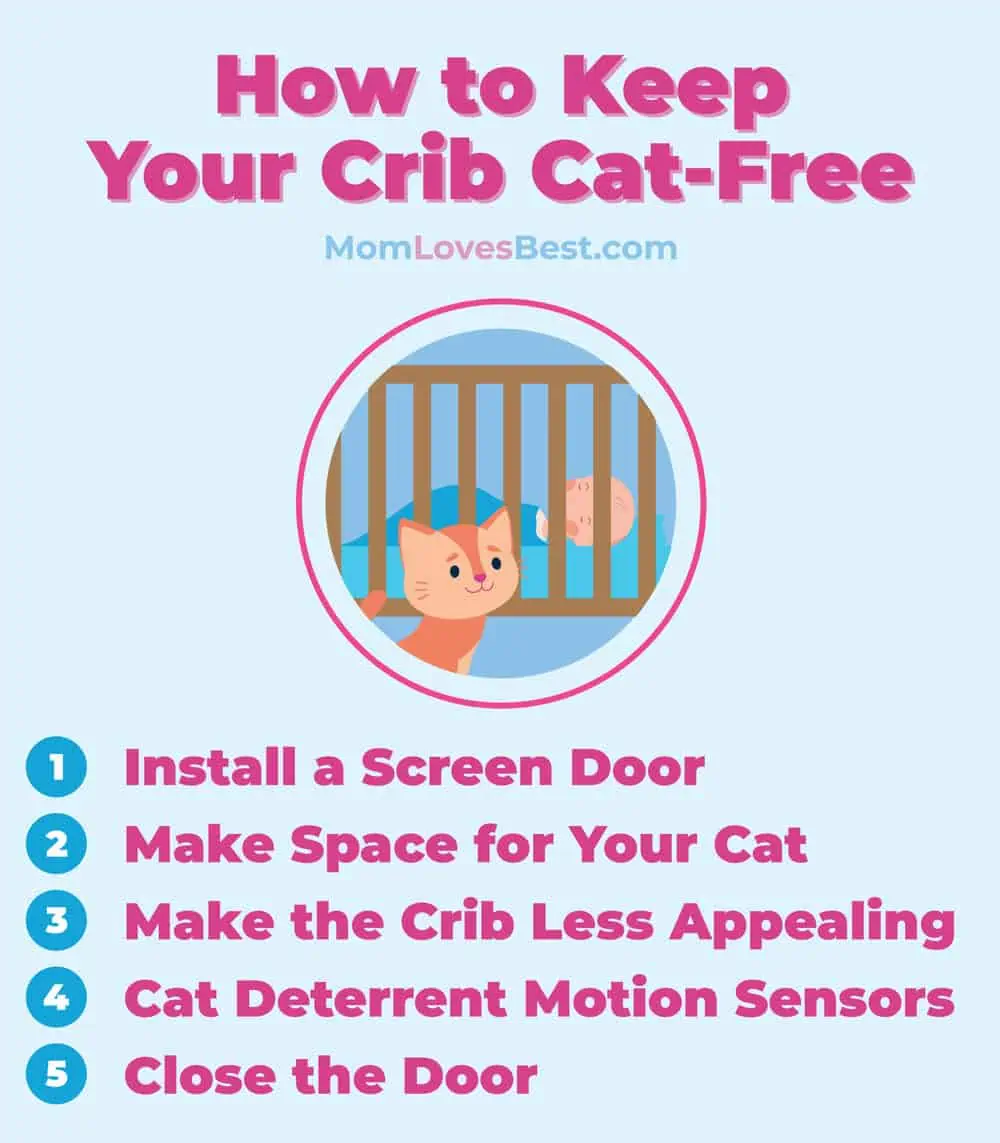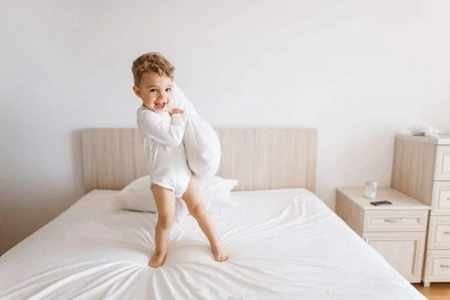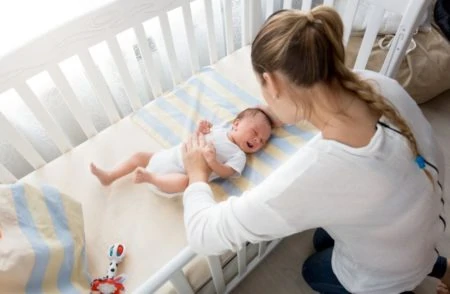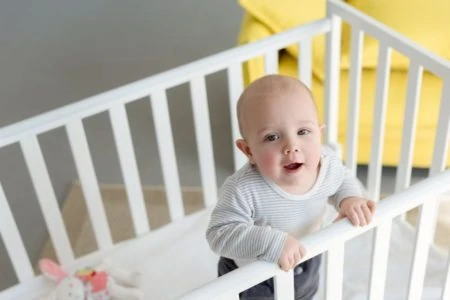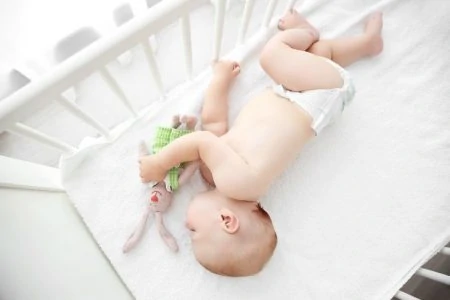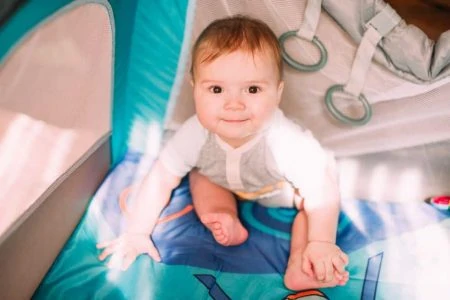If you’re a cat mama and an expectant mom, you’ve likely noticed a trend. Cats love warm, firm surfaces. Unfortunately, a crib mattress looks like the perfect nap zone to a feline.
While a kitty curled up in a nursery looks cute on Instagram, it is dangerous if your newborn is sleeping there too. We know this stress firsthand.
Don’t panic. You don’t have to choose between your fur baby and your human baby. With a few adjustments, you can keep everyone safe.
In this guide, we’ll break down the best methods to keep your cat out of your baby’s crib.
Key Takeaways
- Start early: Introduce baby scents, sounds, and boundaries during your pregnancy to minimize shock.
- Create alternatives: Provide a dedicated perch or bed in the nursery so your cat can supervise safely.
- Use safe deterrents: Make the crib unappealing with tinfoil or double-sided tape before the baby arrives.
- Avoid hazards: Steer clear of unsafe crib tents and toxic repellents like peppermint oil.
Can Cats and Babies Co-Exist?
Cats often get a bad rap. People claim they are territorial, jealous, or unpredictable. While cats love routine, they are also capable of deep affection.
Can a cat accept a noisy new human in their kingdom? Absolutely. Think about how you would introduce a new pet to an existing one. You wouldn’t just throw them together and hope for the best.
The key is preparation. By familiarizing your cat with the changes early and establishing boundaries, you can ensure they coexist safely (1).
Preparing Your Cat for Baby
Don’t wait until you bring the baby home. Spend your pregnancy preparing your cat for the new arrival. Establishing off-limits areas now makes the transition seamless.
Cats are naturally curious. This curiosity is similar to a toddler’s, and it can actually help them bond later.
However, you want to address that curiosity before the crib is occupied:
- Scents: Your cat relies heavily on smell. Bring out baby products like baby lotion, powder, or special shampoo early. Wear the lotion yourself so your cat associates the scent with you and safety.
- Sounds: A crying infant is stressful for everyone, including pets. Play recordings of baby sounds to desensitize your cat. Start at a low volume and increase it gradually while giving your cat treats.
- Space: Cats need an escape route. Set up a quiet, secure area (like a high shelf or a closet corner) where they can hide if the household gets too chaotic.
These steps make the baby’s presence feel familiar rather than threatening. This reduces the urge for your cat to jump into the crib to investigate the “intruder.”
How to Keep Your Crib Cat-Free
Ideally, you should train your cat before the baby arrives. If you are already in the thick of it, don’t worry. There are immediate solutions to keep the nursery safe.
Here are five effective ways to keep the crib strictly for humans.
1. Install a Screen Door
Cats often hate closed solid doors because they want to know what is happening on the other side. A screen door is a fantastic compromise.
Installing a screen door on the nursery allows your cat to see and smell the baby without physically accessing the crib. It keeps the airflow moving and lets you hear the baby clearly while keeping the kitty out (2).
2. Make Space for Your Cat
Your cat likely wants to be near the baby because you are near the baby. They want to be part of the “clowder” (family group).
Instead of banning them from the room entirely, give them a “yes” spot. Set up a cat tree, a window perch, or a comfortable pet bed in the corner of the nursery. This allows them to supervise from a safe distance without taking over the crib.
3. Make the Crib Less Appealing
Cats seek comfort. If the crib is uncomfortable, they won’t want to sleep there.
Before the baby arrives, line the crib mattress with sheets of aluminum foil or double-sided sticky tape. Cats dislike the texture of foil and the feeling of sticky tape on their paws. After jumping in a few times and finding it unpleasant, they will likely decide the crib is not worth the effort.
4. Cat Deterrent Motion Sensors
If you are running out of time, you might need a faster training tool. Motion-activated deterrents are very effective.
These devices usually release a burst of compressed air (like the Ssscat spray) when they detect motion. Place the canister near the crib legs or on a nearby surface. The harmless “hiss” of air startles the cat and creates a negative association with the crib area.
5. Close the Door

Sometimes, physical barriers are the only 100% guarantee. If your cat is persistent, you must close the nursery door while the baby sleeps.
This can be nerve-wracking for new parents who want to hear every sound. A high-quality video baby monitor is the solution here. It allows you to keep the door shut against the cat while keeping a close eye (and ear) on your little one.
3 Things To Avoid
In the rush to secure the home, many parents try methods that seem logical but are actually risky. Here is what you should avoid for the safety of both your child and your pet.
1. Crib Nets and Tents
You might see mesh tents designed to cover the top of a crib. While these claim to keep pets out, they pose a strangulation and entrapment hazard for babies.
If a cat jumps on top of the net, the fasteners can pop off, causing the mesh to collapse onto the infant. It is safer to secure the room than to rig the crib (3).
2. Peppermint Oil
The internet often suggests peppermint oil as a natural cat repellent. While cats do hate the smell, essential oils can be highly toxic to felines.
Inhaling or ingesting peppermint oil can cause severe respiratory distress, liver damage, or pneumonia in cats. Stick to mechanical deterrents like tape or foil instead (4).
3. Totally Excluding Your Cat
Suddenly locking your cat out of the family circle causes behavioral issues. They may act out by urinating outside the litter box or becoming aggressive.
Don’t banish your cat to the basement. Include them in supervised family time in the living room. Let them sniff the baby’s feet while you hold the child. This reassures the cat that they still have a place in the pack.
FAQs
Avoid Cat-astrophes
Your cat is a beloved family member, and the arrival of a baby doesn’t change that. It just means new boundaries are necessary.
Take these steps as a team. Prepare the environment early, use safe deterrents, and offer plenty of alternatives.
By respecting your cat’s needs while securing your baby’s sleep space, you can create a safe, happy, and purr-fect home for everyone.
